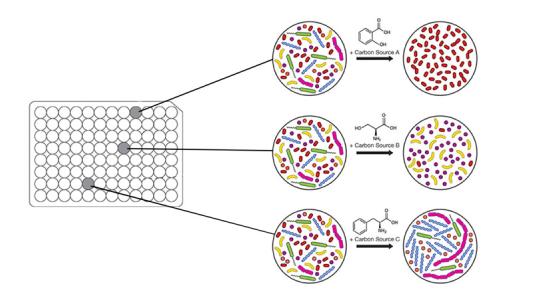
Scientific achievement
In nature, communities of microorganisms that live in all sorts of environments typically work collectively to perform a variety of chemistries. These communities have been refining and improving the way in which they conduct these biochemical transformations for a very long time — they have effectively been performing biochemical “research and development” for billions of years. In a new study, Argonne scientists describe a new way to map how communities of organisms are organized at a fundamental level that would enable this biochemical R&D.
Significance and impact
Scientists are keenly interested in customizing and creating communities of microorganisms to perform complex biochemical tasks for societal benefit. These tasks can range from producing high-value chemicals and biofuels to compounds that can be used as drugs or to detoxify pollutants. Together, the emerging areas of synthetic biology and synthetic ecology hold much promise for generating novel solutions to many present-day problems.
Research details
- Argonne scientists tested how microbial communities from six distinct natural environments could transform individual carbon compounds and how the community itself changes in response to this availability of nutrients.
- Argonne scientists chose these compounds to broadly represent the thousands of different compounds found naturally in soil and water.
- The parallelized enrichment strategy that Argonne scientists devised helped to better understand how minimal communities start forming stable interactions and more complex systems over time.
This research was funded by Argonne’s Laboratory Directed Research and Development program.
Argonne National Laboratory seeks solutions to pressing national problems in science and technology. The nation’s first national laboratory, Argonne conducts leading-edge basic and applied scientific research in virtually every scientific discipline. Argonne researchers work closely with researchers from hundreds of companies, universities, and federal, state and municipal agencies to help them solve their specific problems, advance America’s scientific leadership and prepare the nation for a better future. With employees from more than 60 nations, Argonne is managed by UChicago Argonne, LLC for the U.S. Department of Energy’s Office of Science.
The U.S. Department of Energy’s Office of Science is the single largest supporter of basic research in the physical sciences in the United States and is working to address some of the most pressing challenges of our time. For more information, visit the Office of Science website.